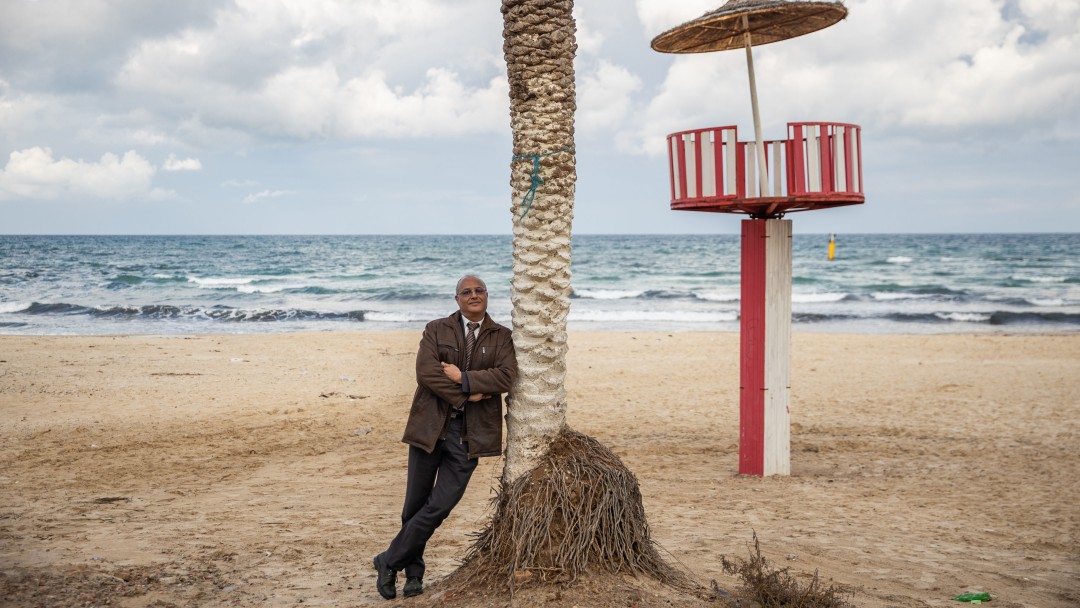News from 2021-11-29 / KfW Development Bank
Protecting Tunisia’s beaches from erosion
KfW to finance coastline protection in light of rising sea level

Tunisia is among the countries most affected by rising sea levels. The nation’s over 1,000 kilometres of coastline along the Mediterranean Sea is at the heart of Tunisia’s economy and threatened by erosion. On behalf of the German Federal Government, KfW is supporting coastal protection with a grant of EUR 18.5 million, thus extending an ongoing programme into a fourth phase. The contract was signed on 26 November.
Tunisia’s beaches are a popular tourist destination, but the value of the country’s coast is more than just recreational. Nine of the nation’s ten largest cities are located here. Two thirds of the 11 million inhabitants live here. They generate 90 per cent of the country’s economic output. In addition to tourism, sources of income also include fishing, industry and agriculture.
Furthermore, wide regions of the coast have dunes worthy of conservation due to their ecological value. There are numerous marine conservation areas along the shore, as well as lagoons and salt marshes that provide refuge areas for fish and birds. Many of them were declared wetlands of international importance as defined by the Ramsar Convention of 1971.
These coastal areas are currently severely affected by erosion. The coastline is shifting further and further inland. Beaches are dwindling away. Seawater is increasingly infiltrating groundwater resources, increasing their salinity. The coastal groundwater reservoir is already overused due to extensive building development.
Project enters the fourth phase
KfW has been supporting Tunisia in its coastal conservation efforts since 2013 on behalf of the Federal Ministry for Economic Cooperation and Development (BMZ). KfW has since provided a total of EUR 38 million in three phases for the “Programme de Protection du Littoral Tunisien”. Now the signed agreement for the fourth phase will inject an additional EUR 18.5 million. For its part, the Tunisian government is bearing a quarter of the associated costs.
The Tunisian Coastal Protection and Planning Agency APAL (Agence de Protection et d’Aménagement du Litoral/APAL) is implementing the many-faceted measures of the project. Submerged breakwaters were installed off the coast of Mammam Sousse to prevent further beach erosion. Now pinewood fences line four kilometres of dunes to stabilise them so they can continue acting as a natural barrier during storms and floods. On the Kerkennah Islands, which lay off the east coast of Tunisia, across from the industrial city of Sfax, boulders protect the shoreline, also providing effective erosion protection. There are plans to replenish the sand on the beaches, but suitable sand resources must be found first. Desert sand, which is abundant in Tunisia, is too smooth and round to use on the beach.
Long-term protection
The barriers which have now been installed will hold for around 50 years. The surrounding communities have been tasked with the maintenance and receive a budget for that work, which motivates the residents to take care of the new structures. In addition, promenades with benches are being created to make the now protected coastal zones even more attractive. Residents of coastal areas are informed about the protective measures through public communication efforts.
The previous phases of the project were able to effectively protect 27 kilometres of coastline. Around 400,000 residents benefited directly and several hundred thousand benefited indirectly from the measures.
Phase four has now been agreed, the intent of which is to rehabilitate the coastline between Sousse and Skanes, where coastal bank protection will be built and extended. There are also plans to replenish sands on the beach north of Djerba, which experienced severe erosion during the past several years.

Share page
To share the content of this page with your network, click on one of the icons below.
Note on data protection: When you share content, your personal data is transferred to the selected network.
Data protection
Alternatively, you can also copy the short link: https://www.kfw-entwicklungsbank.de/s/enzBWrMC.Cm2A
Copy link Link copied